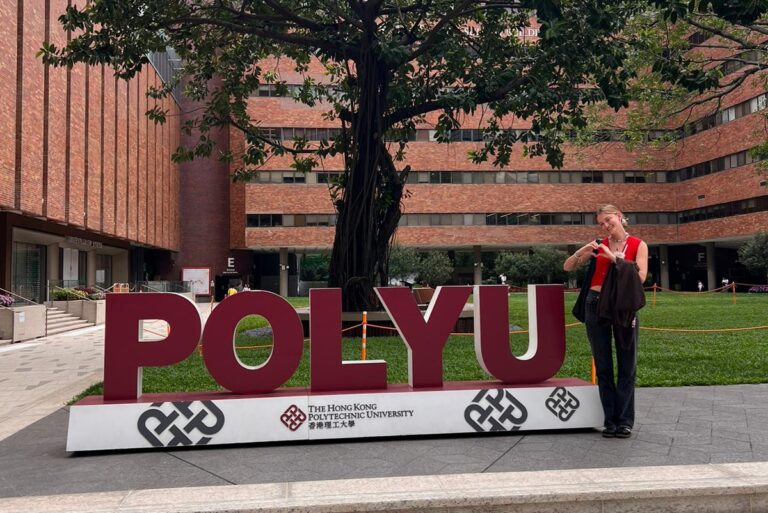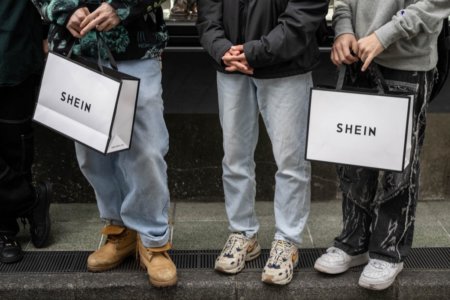
When people think about studying fashion, they often forget that it involves more than just fashion design. There’s fashion buying and merchandising, fashion journalism, fashion technology, and so much more.
For Laura Simon, fashion business management was the path that attracted her the most.
Hailing from Michigan, US, Simon’s passion for the fashion world started at an early age. “Growing up, I would always do little runway shows for my family,” she says. “I loved going shopping, and everything about fashion interested me.”
The idea of pursuing a fashion business management degree came when she was in the midst of college applications. Simon had initially planned to pursue a business degree, rightfully believing that “you can use a business degree in lots of different fields.”
When she realised that she could combine the flexibility of a business degree with her interest in fashion, the application couldn’t have gone out any sooner.
Now, Simon is a student at New York’s Fashion Institute of Technology (FIT) — likened to MIT for the fashion industry. She’s part of the largest and oldest degree programme of its kind in the US, studying everything required of an expert in fashion business management, such as product development and sourcing.
Better yet, she’s learning all of this in New York City, one of the world’s four fashion capitals, the other three being Paris, Milan, and London.
In these cities, the streets are runways to express style, creativity, and innovation; they see the rise and fall of fashion trends and are a source of inspiration for anyone remotely interested in the ongoings of the wider fashion world.

Simon, pictured outside New York’s Fashion Institute of Technology, one of the top fashion schools in the world. Source: Laura Simon.
Still, despite all of New York’s offerings, one thing is missing for Simon: the opportunity to explore another culture and its offerings. After all, Simon is no stranger to new experiences.
“I did a study abroad programme in high school in Turkey in the city of İzmir,” she says. “That really showed me the world and opened me up to travelling and learning about different cultures and having new experiences. After that programme, I knew I wanted to do a study abroad exchange at university too.”
And like all fashion students – no matter what they’re specialising in – Simon looked towards the fashion capitals.
“I wasn’t sure where I wanted to go first,” says Simon. “I know a lot of fashion majors go to Italy because they have good fashion programmes there, but I really wanted to experience something new and something that I had never seen before.”
It was Simon’s interest in the industry’s production aspect that led her to explore Hong Kong as an option.
As a leading production centre and a global hub for sourcing clothing, Hong Kong clothing companies are experienced in many fields. This includes fabric procurement, sales and marketing, quality control, logistics, international and national laws and regulations, and more. The clothing manufacturing industry is one of the city’s largest employers, with 410 establishments and 2,550 workers in 2022.
The city and its offerings were just what Simon was looking for. Luckily for her, Hong Kong Polytechnic University (PolyU) School of Fashion and Textiles had the programme she wanted.
“I’m really interested in production and supply chain management because I have a passion for sustainability,” says Simon. “So, I hoped that by completing a semester abroad in Hong Kong, I would get a more practical understanding of production and supply chain management.”
We caught up with Simon about her time at PolyU, her personal insights into the fashion scenes in Hong Kong, and her hopes for the future of the fashion industry.

As part of her fashion business management programme, Simon got to spend a semester in Hong Kong, learning from experts whilst enjoying the experiences the city has to offer. Source: Laura Simon.
Why choose a semester abroad instead of pursuing your entire degree overseas?
Personally, I want to be close to my family. Plus, my home university, FIT, is well known for its fashion business management programme.
And I think in terms of feasibility, it’s easier for me to do an exchange. I would have liked to stay in Hong Kong longer if I had the option. Still, one semester has been the perfect amount of time to experience a new culture and learn about the city. It’s just been amazing.
Has being in Hong Kong changed your personal style?
I would say yes. I love the way all the girls in Hong Kong dress. They always look so put together and sleek, and their style is so cute. I’ve really gotten into maxi skirts, little pleated skirts, and platform shoes.
I love walking around PolyU’s campus every day to look at everyone’s outfits and to see what they’re wearing. It definitely does inspire me. I was talking to my friend the other day, and I was like, I want to dress like this when I go back home. I wish people in New York were dressed like this.
What have your classes at PolyU been like?
I’m taking five courses: supply chain management, communication studies, quality management, microeconomics, and Mandarin. It’s been nice since the courses are in different departments, and I get to see all the different buildings and meet professors from there.
I’m also really enjoying the coursework and teaching approach they take towards production; everything is more practical since Hong Kong is closer to this side of things, and they have more hands-on experience. One notable difference is that the professors at PolyU are more aware of the realities of the fashion business, and they teach us to apply the knowledge we learn daily instead of just in the workforce.
In terms of learning about sustainable production, my professors are really open to talking about it since everyone knows that the fashion industry needs to become more sustainable. They’re really helpful and engaging in conversations about sustainable practices, and we get to discuss ways that the fashion industry is changing and things we can do.
For instance, in my supply chain management class, we learn about unethical production practices and labour issues within the supply chain. It’s valuable knowledge as it aligns with my career aspirations in sustainable fashion.
What sparked your interest in sustainable fashion?
Since I was young, my dad has been interested in sustainability. He does a lot of work around it, so I grew up seeing him do this work, and I’ve always been kind of curious about it. But I didn’t exactly know what sustainability was or how it worked.
When I was about 14, sustainability became a big topic in high school; everyone was talking about it. Since I’ve always been interested in fashion, I saw how the fashion industry was always slammed for its unsustainable practices. That was when I really started to understand what sustainability was.
When I grew a deeper passion for fashion, I started to mesh the two together and create an interest in sustainable fashion.

PolyU is the sole provider and pioneer of tertiary education in fashion and textiles in Hong Kong, making it an ideal place to pick up the industry knowledge that Simon requires for her long-term goals in sustainable fashion. Source: Laura Simon.
How has being in Hong Kong changed your perception of the fashion scene?
While fashion can seem easily romanticised, I’ve learnt and understood more about the actual processes and challenges involved in the fashion business, such as supply chain struggles and the journey of garments from production to consumers.
Being in Hong Kong, in particular, has opened my eyes to this international perspective on fashion, and being here has grown my passion for sustainable fashion even more.
Being part of PolyU and all of its international students means you get to hear about their firsthand experiences. One of my friends is from Bangladesh, and she told me that the moment she walked out of her house, she saw all the harmful impacts that the fashion industry had had in her country.
It’s crazy to me because stuff like that doesn’t get posted on the news, and unless you know someone from there, you don’t know what’s happening. So, having studied here, I’ve definitely become more interested in learning about the international fashion scene and legislation for fashion from a global perspective.
What do you think is the importance of fashion business management on the larger scale of the fashion industry?
Obviously, the fashion industry is not the most sustainable industry, and there is a lot of room for improvement and change. So, I’m interested in working more in sustainable production and supply chain management and making the fashion industry more sustainable.
Since fashion business management is more behind the scenes, we have the opportunity and responsibility to implement sustainable practices like improving a brand’s code of conduct and all the processes. So, I honestly think it’s one of the most important roles in the business, even though it’s sometimes overlooked.
What are your goals for the future?
I’m still learning a lot about the industry and exploring the different jobs I could do and pursue once I graduate. But my current goal is to work as a production manager or in sourcing for a sustainable fashion company.
I don’t support fast fashion. I think fast fashion is such a big part of everyone’s style nowadays because people are always trying to stay on top of the trends, and the only way to do that is by purchasing from fast fashion brands. I want to try to implement more sustainable measures, spread the word, and grow an overall interest in sustainable fashion.










